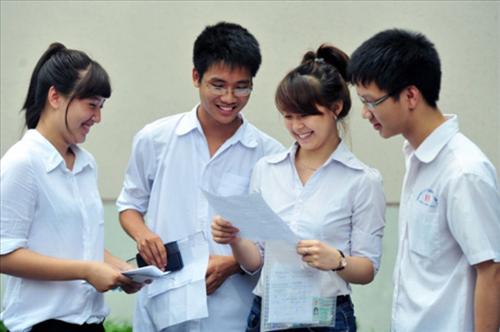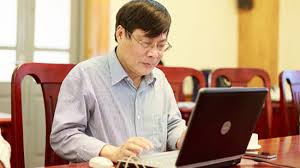
Students have just had a graduation exam that is considered innovative: the exam structure has been shortened to only two questions, and the time allotted is only 120 minutes. Looking closely, the content and requirements are actually not much different from previous exams. Question 1 is essentially an integration of questions 1 and 2 from the past. These are considered reading comprehension and social commentary questions. Previously, these were separated into two parts; now they are combined into one. The most significant change in this year's graduation exam is the time limit and the question content is more closely aligned with current pressing issues facing the country. To prevent Literature from being a subject of "nonsense," I think this approach to question design is correct. This year's university entrance exam will also follow this direction. Specifically, what will it be like?

Teacher Tran Hinh
Of course, structurally, this year's university entrance exam will still consist of 3 questions (unlike the graduation exam which has 2 questions). The time allotted for the Literature exam remains 180 minutes (unlike the graduation exam which has 120 minutes). Therefore, a Literature exam will include a 2-point reading comprehension question, a 3-point social commentary question, and a 5-point literary analysis question.
First, regarding the 2-point reading comprehension question, the exam may have requirements that are more closely aligned with the curriculum. For a long time, this question has often focused on rote memorization, but in recent years, the exam has taken a new direction. For example, the reading comprehension section has focused on asking about literary knowledge, such as metaphors and similes in the work, the meaning of details and metaphors, and the artistic style of the work. This year, this reading comprehension section may expand to include Vietnamese language knowledge, syntax, rhetoric, and even broader social issues. For instance, in the recent high school graduation exam, a passage from a newspaper was used to ask students what literary style it belonged to (literary, journalistic, scientific, administrative, political). The curriculum also includes two literary essays that could be used as reading comprehension questions. That is "An Era in Poetry" by Hoài Thanh, and "Nguyễn Đình Chiểu, a Shining Star in National Literature" by Phạm Văn Đồng. Therefore, to handle this question well, students cannot afford to study literature superficially as before, simply attending "cram schools" and copying texts and pre-written books. They must read the works carefully. From this year's Literature exam onwards, there will no longer be questions requiring rote memorization. Students must be required to read and understand the works.
With a 3-point social commentary essay question, a series of recent exams (high school graduation, high school entrance) have focused on a pressing issue in our country today: the issue of maritime territories and islands. Will the university entrance exam continue in that direction? I think that current national issues will certainly always be considered important. But that issue is not just about maritime territories and islands, or China's 981 oil rig; it could be broader: the issue of national territory, the issue of the tradition of resisting foreign invaders, the issue of patriotism and national pride, the responsibility of young people in the current situation of the country, including the issue of tolerance, the meaning of a beautiful life, and life ideals. Furthermore, the social commentary section may also relate to other lessons that students often pay little attention to, such as: On Morality and Society in Our Country (Phan Châu Trinh), The Path to Becoming a Modern Scholar (Nguyễn Khắc Viện), The Early Days of the New Vietnam (Võ Nguyên Giáp), Looking at the National Cultural Heritage (Trần Đình Hượu), Message on World AIDS Day (Cophi Annan), Systems Thinking – The Source of Innovative Thinking (Phan Đình Diệu). Last year, the social commentary exam for Group C quoted an idea from Trần Đình Hượu's "Looking at the National Cultural Heritage" to ask students to write about the good and bad aspects of Vietnamese habits in the past. This is an open-ended question, so to answer it well, I believe that in addition to the knowledge learned from textbooks, students should also learn from real-life experiences, media, and television. And when writing, they should express themselves sincerely, not just shout slogans.
For the 5-point literary essay question, recent exam papers have often expanded to combine two issues or two works. The question even frequently repeats a special type of essay: "personal reflection" (expressing feelings about two stanzas of poetry, expressing feelings about two endings of a work, expressing feelings about the hidden beauty of two characters, expressing feelings about two comments on the same issue in the work...). Don't panic. In reality, when you start writing an essay, regardless of the required essay type, the ultimate goal is still to express the beauty and merit of the work's content and form. However, remember that when two issues or two works are combined in one exam question, you should immediately think about the need for an analysis and comparison of the similarities and differences between the two works. If the question asks you to agree or disagree with two comments on a given issue, you need to clearly state whether your viewpoint is right or wrong. Or both are correct. For example, last year, question 3.a of the D-block exam asked: "Regarding the yearning to enjoy life in Xuan Dieu's poem 'Vội vàng' (Hurry), some argue that it is the voice of a negative, selfish ego. Others assert that it is the voice of a positive, individual ego." Students must affirm that the first opinion is wrong and the second is correct. Meanwhile, question 3.b asks: "Regarding the character Phung in Nguyen Minh Chau's short story 'Chiếc thuyền ngoài xa' (The Boat Far Away), some argue that the prominent feature of this artist is a sensitive soul and a passion for the poetic beauty of nature. Others emphasize that the profound beauty of the artist Phung lies in a heart filled with anxiety and concern for the human condition." Students must affirm in their essay that both opinions are correct. Of course, when analyzing the essay, it is necessary to clearly indicate whether it is correct or incorrect, and in what specific way. Once the exam question includes such opinions, it provides a specific direction for developing your answer. By understanding this, you will have no difficulty with any type of exam question.
Another important issue, which everyone taking the university entrance exam this year probably wants clarified: with so many lessons in the textbook (around 40 units), how can the content be condensed to make learning easier? As a teacher, I never advise students to focus on only certain topics or to cram for specific subjects; I always encourage them to study all the lessons in the textbook. However, if more specific guidance is needed on which lessons to prioritize, students can certainly focus more on lessons that weren't included in last year's university entrance exam, as well as those that weren't in the recent high school graduation exam. If we are even more careful, we can also "predict" which lessons will be used for the 2-point question and which will be chosen as the source for the 5-point question. This means that this year, the following lessons will be considered more important: Trang Giang (Huy Can), Day Thon Vi Da (Han Mac Tu), Chieu Toi (Ho Chi Minh), Tu Ay (To Huu), Hai Dua Tre (Thach Lam), Chu Nguoi Tu Tu (Nguyen Tuan), Hanh Phuc Cua Mot Tang Gia (Vu Trong Phung), Chi Pheo (Nam Cao), Vinh Biet Cuu Trung Dai (Nguyen Huy Tuong), Viet Bac (To Huu), Dat Nuoc (Nguyen Khoa Diem), Song (Xuan Quynh), Dan Ghi Ta Cua Lorca (Thanh Thao), Nguoi Lai Do Song Da (Nguyen Tuan), Ai Da Dat Ten Cho Dong Song? (Hoang Phu Ngoc Tuong), Vo Chong A Phu (To Hoai), Vo Nhat (Kim Lan), Rung Xa Nu (Nguyen Trung Thanh), Nhung Dua Con Trong Gia Dinh (Nguyen Thi). Since the 5-point question has two multiple-choice options, advanced texts like "Tuong Tu," "Doi Thua," "Lai Tan," "Tieng Hat Con Tau," and "Mot Nguoi Ha Noi" can be skipped. I want to reiterate that these pre-exam notes are not intended to encourage students to focus on only certain topics or memorize specific answers, but primarily to help us prepare better for the exam. After all, we've already spent 12 years studying Literature. These are just minor notes.
Finally, to achieve the highest possible score, you should also pay attention to your presentation: before starting the exam, spend the first 15 minutes thinking and analyzing the question carefully, then create a concise outline to avoid rambling. The essay should be written in clear, sharp ink, without erasures, arguments should begin at the beginning of each line, minimize spelling and grammatical errors, and express ideas smoothly, clearly, and concisely. Try to answer all questions on the exam; don't leave any unfinished. I wish you the best of luck in your exam.
Author:Tran Hinh
Newer news
Older news